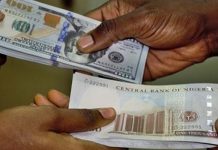The U.S. dollar surged nearly 1 percent against the euro on Wednesday to its strongest since Aug. 20 after European data signaled that economic growth could be flagging across the eurozone.
Euro zone business growth slowed more than expected this month, a widely watched Purchasing Managers Index (PMI) survey showed. German private-sector growth fell to its lowest in more than three years, and manufacturing in France hit a 25-month low, according to other surveys.
The market is also concerned about an escalating U.S.-China trade war, a heated debt dispute in Italy and the prospect of tightening financial conditions. Against the dollar, the euro fell as much as 0.79 percent, breaking below the $1.14 level and heading toward its biggest daily loss since late September.
The European reports “came in weaker than expected and suggest that some of the softness we saw in Q2 and Q3 may not be as temporary as people were assuming,” said Daniel Katzive, head of foreign exchange strategy for North American at BNP Paribas.
“Even though the U.S. is starting to show some cracks and vulnerability to global trade and geopolitical stresses, Europe is still more vulnerable from an economic perspective.”
Weakness in the single currency supported the dollar index, which rose 0.4 percent against a basket of six rival currencies to 96.296.
The euro also fell 0.4 percent against the Swiss franc to 1.137 francs, a two-week low.
The European Central Bank holds its monetary policy meeting on Thursday, and investors will be looking for any comments about the deepening row between the European Union and Italy over Rome’s budget.
The Canadian dollar fell by 0.76 percent on Wednesday morning after the country’s central bank raised interest rates as expected and said more hikes would be needed to keep inflation in check.
The Bank of Canada – which has now lifted rates five times since July 2017 as the economy strengthens – tweaked its standard language on future hikes, dropping previous references to the gradual pace of tightening.
The Japanese yen, often bought when broader markets slide, gave up its earlier gains, suggesting some renewed demand for risk-taking as stock markets rebounded on Wednesday. The yen weakened to 112.51 yen per dollar, but remains almost two percent stronger since Oct. 4.
Sterling fell 0.39 percent to $1.293 amid intensifying concerns about whether the UK can reach a Brexit agreement.












